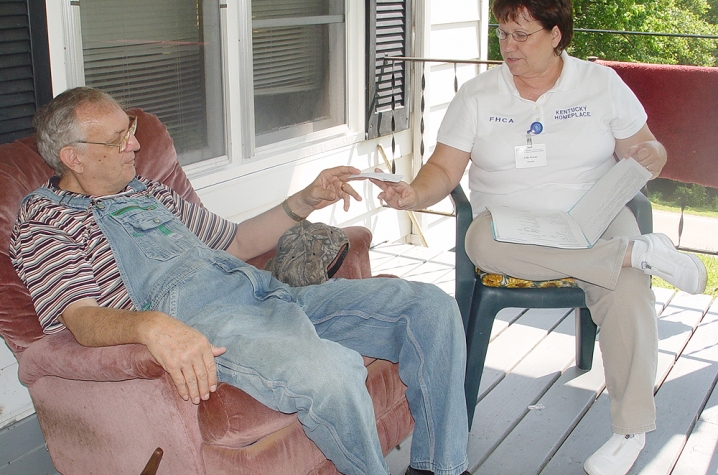Kentucky Homeplace Receives Gift from Anthem Foundation to Improve Diabetes Outcomes

Hazard, Ky. (Sept. 9, 2013) – Kentucky Homeplace has been awarded a second gift of $150,000 from the Anthem Foundation to continue work on a special research project," Improving Diabetes Outcomes Phase Two (I DO 2)."
The gift enables Kentucky Homeplace to expand the work in diabetes self-management education (DSME) that it began with the first gift received from the Anthem foundation in 2011, said William Mace Baker, director of Kentucky Homeplace. The DSME model involves Kentucky Homeplace community health workers (CHWs) supporting nurse-led education modules. These modules are designed to help people with diabetes better manage their diabetes through improved self-testing and lifestyle changes that decrease complications and improve outcomes.
Kentucky residents who live in rural counties, particularly those in Appalachian counties within the “Diabetes Belt,” have some of the highest rates of diabetes in the nation. The “Diabetes Belt” is defined by the U.S. Centers for Disease Control and Prevention (CDC) as 644 counties covering 15 states. “Diabetes Belt” counties are those in which 11 percent or more of the adults have been diagnosed with having diabetes. By contrast, the diabetes rate for the U.S. is 8.5 percent. The severe prevalence of diabetes in Kentucky is indicated by the fact that 68 of its 120 counties are included in the “Diabetes Belt.”
The CDC estimates that 30 percent of the excess risk of diabetes in the “Diabetes Belt” counties was associated with modifiable risk factors such as sedentary lifestyle and obesity, which indicates the potential benefit of DSME. Unfortunately, the number of certified diabetes educators (CDEs) in the “Diabetes Belt” area of Kentucky is much lower than in other areas of the state.
Research conducted at the University of Kentucky Center of Excellence in Rural Health (CERH) indicates there are 0.35 CDEs/1000 adult population in Kentucky's 68 Diabetes Belt counties compared to 0.98/1000 in the state's 52 “non-Diabetes Belt” counties.
“Anthem’s gifts have given us an invaluable opportunity to address this disparity by studying the effectiveness of a DSME delivery model that involves CHWs in the process of diabetes education. CHWs add value by reinforcing and enhancing participants’ understanding of the education provided by a registered nurse. CHWs also improve our ability to reach a more significant portion of the population that is often underserved,” said Dr. Fran Feltner, principal investigator for Kentucky Homeplace and director of the UK CERH.
Outcomes of the first study show a total of 215 participants from 26 counties completed the study. Participants were predominately female (65.7 percent.), characterized by low education level, poverty, limited health literacy, and no health insurance. Most had never been to a diabetes educator. Key findings showed improved glucose testing and lower hemoglobin A1c measures after the DSME intervention.
Anthem’s additional gift to fund I DO Phase 2 has enabled Kentucky Homeplace to expand the project to include regions in western Kentucky and enroll more than 300 additional participants for the DSME. More than 2,800 clients were screened by CHWs to determine if they either have diabetes or are at risk for developing diabetes.
“Identifying clients who are at risk for diabetes is also very important because the education we offer has excellent potential to help people prevent the disease,” said Feltner.
Kentucky Homeplace was originally developed in 1994 by the UK CERH as a demonstration project in 14 counties. The overwhelmingly positive impact of the demonstration motivated the Kentucky General Assembly to create special funding for Kentucky Homeplace that has enabled operations to continue for nearly two decades to link tens of thousands of rural Kentuckians with medical, social and environmental services they otherwise might have gone without.
Today, Homeplace has over 30 employees working across a geographic service area that spans the length of the state, including most counties in eastern and western Kentucky and those along its southern border where health disparities are most severe.
For more information please visit www.kyruralhealth.org or call toll free 1-855-859-2374.
Media Contact: Kristi Lopez, (859) 323-6363 or kristi.lopez@uky.edu




